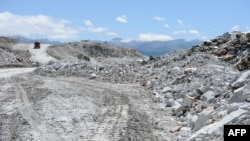A new report Tuesday said Islamic State, the Taliban and corrupt power brokers in Afghanistan are making hundreds of thousands of dollars from illegal and abusive mining of talc, almost 80 percent of which is ending up in the United States and Europe.
Earnings from illegal talc mining is funding insurgent activities and fueling corruption, undermining the chances of the war-shattered country to ever see stability, warned the report by Global Witness advocacy group.
Talc is the common ingredient found in baby powder, cosmetics, paint, paper and plastics.
Much of the talc extraction is happening in the mineral-rich volatile eastern province of Nangarhar on the Pakistani border.
Taliban insurgents and the Afghan affiliate of IS, known as Khorasan Province, or IS-KP, operate bases in several districts of the border province where satellite photos have shown marks of extensive mining for minerals, noted the report.
Afghan talc is transported across the border into neighboring Pakistan, where it is mixed with locally mined talc and then shipped around the world, making up at least 60 percent of Pakistani exports, the report said.
Some 40 percent of talc exported from Pakistan goes to the United States, the biggest single market, it added. Afghanistan exported more than 560,000 tons of talc to Pakistan, according to 2016 trade figures cited in the report.
"Access to talc mines is also a current source of conflict between the IS-KP and the Taliban — already estimated to be making around $300 million a year from Afghanistan's mineral wealth — in the mineral-rich Nangarhar province," it said.
The report noted that IS is known to have vastly exploited natural resources in Iraq and Syria, and the group now appears to be turning its attention to Afghanistan, particularly the country's talc mines. It said that IS-KP controls a limited amount of territory in Afghanistan, but that includes parts of the country's rich mineral wealth, particularly talc, chromite and marble.
While talc may be the least glamorous of conflict minerals, the report said, ultimately much of its value comes from America and Europe.
"Consumers and companies in these countries could, therefore, unknowingly be funding the Afghan insurgency," it said.
The advocacy group called for Afghanistan and its international partners to prioritize better security around mining, controls on supply chains and reforms to the mining law, "not just for the sake of ordinary Afghans, but to help end a conflict that has gone on too long."




